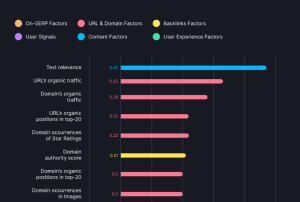With the rapid digitalization of our world, the old school practices of SEO are giving way to more advanced strategies, marking the significant SEO evolution. Gone are the days of keyword stuffing and creating poor quality links, as these tactics are now deemed outdated and ineffective. Instead, the focus has shifted towards user-centric SEO, emphasizing quality content and user experience. Our previous post on seo wordpress provides a deeper insight into creating quality content for your blog. This evolution doesn’t stop here. With the advent of AI and voice search, the future of SEO is on the brink of another transformation. Are you ready to adapt and evolve? Read on to discover more about this exciting journey.
”Summary
The article highlights the dynamic SEO evolution, tracing the journey from traditional practices that emphasized keyword stuffing and link creation to modern, user-centered strategies. Notably, these outdated techniques often led to poor user experiences and were penalized by search engines, necessitating a shift in SEO strategies.
Today, the focus is on enhancing user experiences by providing quality, relevant content, and optimizing websites for user needs. User-focused SEO factors in elements like user-friendly design, fast loading times, and audience-specific content, which search engines like Google highly value.
Content marketing plays a significant role in SEO, emphasizing quality content that simultaneously meets user needs and is optimized for search engines. Techniques like keyword optimization and link use boost site visibility and credibility and help retain users, establish brand authority, and increase engagement and visibility.
The article concludes by predicting another seismic shift in SEO due to the growing integration of artificial intelligence and increased use of voice search, emphasizing the need to stay abreast of these technological advances to maintain a competitive edge.
Traditional SEO Practices: A Foundation for Success
Understanding traditional SEO practices is crucial in comprehending the SEO evolution. In the early stages, the focus was primarily on keyword stuffing and link building to attract search engines. But as we moved forward, these tactics became less effective and often counterproductive.
Keyword Stuffing in Traditional SEO
In the past, one of the most common SEO practices was keyword stuffing. This method involved overloading a webpage’s content with the targeted keyword in an unnatural manner. The main aim was to manipulate a site’s ranking in search engine results. However, this strategy led to a poor user experience and was eventually penalized by search engines. An example of keyword stuffing would be repeating the word “SEO evolution” excessively in a blog post without integrating it naturally into the content.
Link Building in Traditional SEO
Another common practice in traditional SEO was link building. Website owners would generate as many backlinks as possible to increase their site’s visibility and credibility, regardless of the quality or relevance of those links. For instance, a blog about ‘SEO evolution’ might have linked to unrelated sites purely to build their link quantity. However, search engines like Google started penalizing such practices, leading to a shift towards quality over quantity in link building.
In conclusion, traditional SEO practices laid the groundwork for the SEO evolution, but their misuse led to changes in search engine algorithms. This required SEO strategies to evolve and become more user-centric, which we will delve into in the next section.
The Shift Towards User-Centric SEO Strategies
As we delve into the era of digital marketing, one thing has become clear: the user is king. The shift towards user-centric SEO strategies marks a significant change in the field of search engine optimization. Rather than focusing solely on keywords and link-building, SEO has evolved to consider the user’s experience as a critical element.
Understanding User-Centric SEO
Simply put, user-centric SEO involves optimizing your website not just for search engines, but also for the users. It’s all about providing a positive user experience by delivering high-quality, relevant content that answers questions, solves problems, or otherwise meets the needs of the users. For example, if your business sells organic beauty products, your SEO strategy could include creating blog posts on the benefits of organic products, how-to guides on using them, and answering common questions about organic beauty. This approach ensures that the content is valuable to the users, which in turn increases the likelihood of them staying on your site longer and potentially making a purchase. Also, it’s worth noting that search engines like Google have started to prioritize user-centric content in their algorithms, further emphasizing the importance of adopting this SEO evolution.
Key Elements of a User-Centric SEO Strategy
Several elements play a critical role in a user-centric SEO strategy. First is the website design – it must be clean, easy to navigate, and mobile-friendly. A user-friendly site encourages visitors to stay longer and explore, reducing bounce rates. Second is content relevance and quality. Your content should provide valuable information that is tailored to your audience’s needs and interests. Also, using various types of content like videos, infographics, and blogs can cater to different user preferences and boost engagement. Lastly, it’s essential to ensure that your website is fast. Slow loading times can frustrate users and lead them to leave your site, which can negatively impact your SEO rankings. Therefore, performance optimization should be a key part of your SEO strategy.
Leveraging Content Marketing for SEO Optimization
Understanding the Role of Content Marketing in SEO
The evolution of SEO has seen content marketing become a crucial part of optimization strategies. This transition is rooted in the fact that quality content is highly valued by search engines, making it a significant factor in SEO rankings. It’s no longer just about stuffing keywords into your content; it’s about providing valuable and relevant information that meets the needs of users while also being SEO-friendly.
How to Leverage Content Marketing for SEO
There are several ways to leverage content marketing for SEO optimization. One of the primary methods is through keyword optimization. Strategically incorporating your target keywords into your content can help improve your site’s visibility on search engine results pages. However, remember that keyword stuffing can actually harm your SEO efforts. It’s essential to maintain a natural and reader-friendly content flow.
Another way to leverage content marketing for SEO is through internal and external linking. Internal links can help search engines understand the structure of your website, while external links can boost your site’s credibility. However, it’s important to use high-quality and relevant links to avoid any potential penalization from search engines.
Benefits of Leveraging Content Marketing for SEO
Leveraging content marketing can have several benefits for your SEO efforts. For one, high-quality content can help attract and retain users on your site, reducing bounce rates and increasing the chances of conversions. Additionally, consistently publishing relevant content can help establish your brand as a thought leader in your industry, which can boost your site’s credibility and SEO performance.
Finally, content marketing is a great way to engage with your audience, encouraging them to share and interact with your content, resulting in increased visibility and potential for backlinks, which are highly beneficial for SEO.
The Future of SEO: Embracing AI and Voice Search
As we look towards the future, it’s clear that SEO is about to undergo yet another transformation. With the rapid development of artificial intelligence (AI) and the increasing use of voice search, the way we approach SEO is set to change dramatically. Let’s delve into these two aspects and their implications for SEO practices.
Artificial Intelligence and SEO
AI has been increasingly integrated into SEO strategies, and it’s safe to predict that this trend will continue to grow. AI’s ability to analyze user behavior, identify patterns and trends, and then make data-driven recommendations is invaluable in SEO. For instance, Google’s AI algorithm, RankBrain, plays a significant role in determining how pages are ranked. It interprets the user’s search queries and provides results that best meet the user’s needs. Thus, understanding and adapting to AI’s influence is essential for the SEO evolution.
Voice Search and SEO
Voice search is another technology that is rapidly growing and influencing SEO strategies. With the rise of smart devices like Alexa and Google Home, more and more people are using voice search. Consequently, SEO needs to adapt to this trend. For instance, voice search queries are typically longer and more conversational. This calls for a change in keyword strategy, favoring long-tail keywords and phrases that mimic natural speech. Additionally, since voice search is often used for local searches, making sure your business is optimized for local SEO is crucial.
In conclusion, the future of SEO lies in embracing these technological advances. By understanding and integrating AI and voice search into SEO strategies, one can stay ahead of the SEO evolution and maintain a competitive edge in the digital landscape.
Conclusion
The SEO evolution has made a remarkable journey from traditional keyword-stuffing and link-building practices to more user-focused strategies. Emphasis has shifted towards providing quality and relevant content, optimizing user experience, and keeping pace with the latest technological advancements. As search engines continue to evolve, prioritizing user-oriented SEO and integrating AI and voice search into your SEO strategy are vital.
Moreover, content marketing plays an integral role in SEO, enhancing visibility and credibility while fostering user engagement. The future of SEO lies in harnessing these modern strategies, ensuring a competitive edge in an ever-changing digital landscape. Therefore, adapting and evolving with these changes is not an option but a necessity for businesses aiming for online success.

